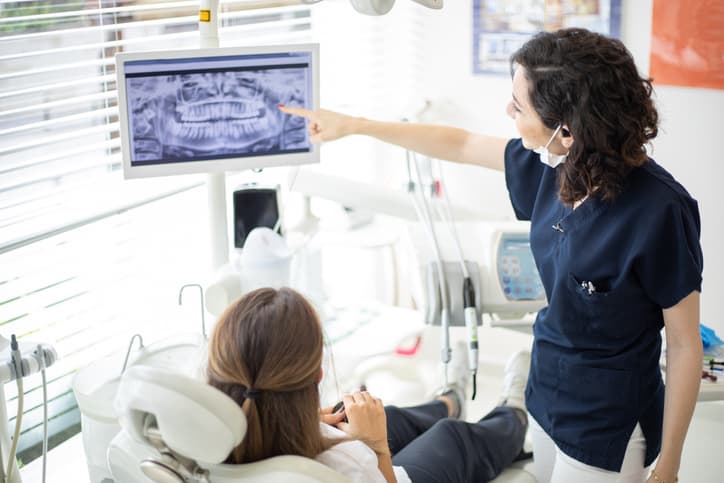
What Causes a Bruised Tooth?
Just like a bruise on your knee from falling off a bicycle, a bruised tooth is typically caused by trauma or injury. The black and blue of a body bruise are the results of capillaries bursting and darkening the surface of the skin. A similar discolouration can occur on an injured tooth. The impacted tooth might also ache from the blow to the ligaments that support it.
When dental trauma occurs (such as a sports injury or biting a hard object), the soft tissue and ligaments around a tooth absorb the impact. When this happens, it causes the capillaries around the tooth to burst and travel through the apical foramen, or the opening at the tip of the root, giving the tooth a pink discolouration.
What Does It Look Like?
The injured tooth may turn grey, which could be permanent. Your dentist will likely want to monitor a grey tooth closely since it could mean that the pulp inside it is no longer vital and is at risk for infection or decay, explains the American Dental Association, thus requiring a root canal.
A pink tooth isn’t very attractive, but luckily it may be able to heal back to its normal colour. The pinkish hue could be a sign of internal root resorption, explains a case series in the Journal of Conservative Dentistry.
Treating a Bruised Tooth
According to ToothIQ, the treatment for a tooth that has suffered an impact but is not cracked or luxated (moved in its socket) often boils down to careful monitoring. Your dentist may ask you to return for a series of followup appointments. They will check for problems, such as an abscess or sensitivity. They may also take X-rays and eventually perform a root canal, if necessary.
While you are waiting for the tooth to heal and for your dentist to determine if you need further treatment, there are a few things you can do to soothe the ache.
- Begin with over-the-counter pain relievers. Inflammation from an oral injury can be painful. Medication like ibuprofen or acetaminophen can sometimes help reduce swelling and aches. It’s unlikely that your dentist will prescribe any stronger painkillers. Be sure to follow the directed instructions for OTC medicine or speak with a doctor or pharmacist before taking any.
- Ask about a custom night guard. If the damage was a result of teeth grinding in your sleep, your dentist might suggest wearing a guard at night to protect your teeth and ligaments from future damage.
- Be patient. Treatment for a bruised tooth may not happen immediately. Acting too quickly can result in unnecessary treatment, so it’s important to take time to heal and follow your dentist’s instructions. Your dentist will identify what solution is best suited for the type of trauma the tooth has experienced.
Seeking help from your dentist is crucial for treating traumatic dental injuries. If your tooth is painful or discoloured, make an appointment as soon as possible to find out what you should do to treat it.
